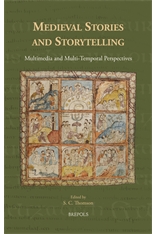
S.C. Thomson (dir.), Medieval Stories and Storytelling. Multimedia and Multi-Temporal Perspectives
Medieval Stories and Storytelling
Multimedia and Multi-Temporal Perspectives
Edited by S.C. Thomson
Brepols, 2021,
319 p., 19 b/w ill. + 3 colour ill. — ISBN: 978-2-503-59050-9, € 90 HT
An interdisciplinary exploration of how medieval stories were shaped, transformed, and transmitted by interactions between tellers, media, and audiences.
The shaping and sharing of narrative has always been key to the negotiation and recreation of reality for individuals and cultural groups. Some stories, indeed, seem to possess a life of their own: claiming a peculiar agency and taking on distinct voices which speak across time and space. How, for example, do objects, manuscripts, and other artefacts communicate alternative or complementary narratives that transcend textual and linguistic boundaries? How are stories created, reshaped, and re-experienced, and how do these shifting contexts and media change meaning?
This volume of essays explores these questions about meaning and identity in a range of ways. As a collection, it demonstrates the importance of interdisciplinary and context-focused enquiry when approaching key issues of activity and identity in the medieval period. Ultimately, the process of making meaning through shaping narrative is shown to be as vital and varied in the medieval world as it is today.
With a wide range of different disciplinary approaches from leading scholars in their respective fields, chapters include considerations of art, architecture, metalwork, linguistics, and literature. Alongside examinations of medieval cultural productions are explorations of the representation and adaptation of medieval storytelling in graphic novels, classroom teaching, and computer gaming. This volume thus offers an interdisciplinary exploration of how stories from across the medieval world were shaped, transformed, and transmitted.
Table of Contents
Introduction: Stories and their Tellers
S. C. Thomson
Beowulf
Goes to School: Adaptations and transformations for the Secondary Classroom
Janes Coles, Theo Bryer, and Daniel Ferreira
‘Retelling Old Stories for New Audiences’: Shaping and Visualizing Beowulf through Gareth Hinds’ Graphic Novels [The Collected Beowulf (2003) & Beowulf (2007)]
Jorge Luis Bueno Alonso
Being Numerous: Communal Storytelling in Li?smannaflokkr
Erin Michelle Goeres
Performance and Emotions in Four Epic Works about Roland
Evelyn Birge Vitz
Towards a Poetics of Storytelling, or, why could Early Medieval English Writers not stop telling the Story of Judith?
S. C. Thomson
Mosaics, Marbles, and Medievalisms: Displaying the Foundation Narrative of the English Church in Westminster Cathedral
Meg Boulton
A Storied Cathedral: Space and Audacious Women in Early Medieval Durham
Euan McCartney Robson
Dynamic Material Aspects of Writing in Wolfram of Eschenbach’s Titurel
Christoph Witt
Iceland’s Alexander: Gunnarr and Pale Corn in Njáls Saga
Richard North
Sensing Stories: Iconography, Pattern, and Abstraction in Metalwork from Early Medieval England
Melissa Herman
A Telling Tradition: Preliminary Comments on the Epic of Manas, 1856–2018
James Plumtree
Index
Simon Thomson is Senior Lecturer in Medieval English Language and Literature at Heinrich-Heine Universität in Düsseldorf. His research interests include early medieval palaeography and codicology, hagiography, and Old English poetry. He has published on Beowulf, its manuscript, and its modern adaptations; on the early medieval rewritings of Saint Christopher; and on the English reign of Cnut the Great.